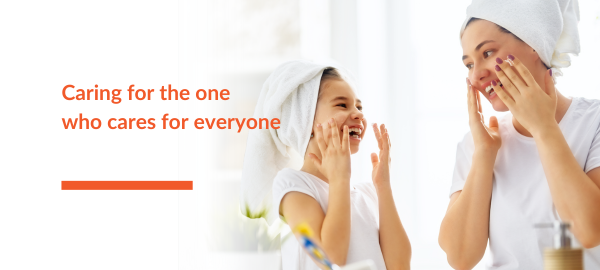We’re SolarCareB3. Fighting sun damage is what we do, and niacinamide is how we win.
But niacinamide isn’t just powerful against sun damage. It’s good for almost everything and everyone, especially mums. Because no matter how you became a mum (birth, adoption, fostering, step-parenting) or how you nourish your baby (breastfeeding, bottle-feeding, or a bit of both) mum skin changes. And when you’re busy caring for everyone else, it’s easy to put yourself last.
With Mother’s Day around the corner, maybe it’s time to change that. Whether you’re here to support a mum you love, or you are a mum realising you deserve some care too, let’s take a look at the six common skin changes mums face, why they happen, and what you can do about them.
1. Hormonal Changes and Pigmentation (Melasma)
Hormones have a huge impact on the skin — pregnancy, breastfeeding, weaning, perimenopause, even the ongoing mental load of parenting. One common result? Melasma — dark patches across the cheeks, forehead, or upper lip. When hormone levels like oestrogen and progesterone spike, they stimulate melanocytes, which are pigment-producing cells. Sometimes this process can be a bit chaotic, leading to uneven patches. While niacinamide won’t treat the underlying hormonal cause, it does help brighten and even skin tone over time by blocking the transfer of pigment from those overexcited melanocytes to your surrounding skin cells. In other words, even if your skin is making extra pigment, niacinamide helps stop it from settling in where you can see it.
2. Dryness and Dehydration
Mum life often means long days, broken sleep, and rushing around — and hydration falls to the bottom of the list. Breastfeeding especially can be dehydrating — it draws on your body’s water and blood supply to nourish your baby, leaving less hydration available for everything else (including your skin). But even bottle-feeding mums aren’t immune to dehydration — busy days, missed meals, too much coffee and not enough water all take their toll — leading to dry, tight, and fatigued skin. Niacinamide helps by supporting the skin barrier, improving moisture retention, and reducing water loss, helping dry skin bounce back even when you’re running on empty.
3. Sun Damage
From pram walks to park trips and weekends outdoors, mums often spend more time in the sun — and UV exposure leaves its mark. Fine lines, pigmentation, rough texture and loss of firmness are all signs of accumulated sun damage. But niacinamide is clinically shown to support DNA repair processes, strengthen the skin barrier, minimise pigmentation, and improve overall skin texture. It also helps counteract UV-induced immune suppression, which means your skin can better repair itself and defend against visible damage. Paired with daily SPF protection, it’s one of the most effective ways to support sun-damaged skin.
4. Stress (and Stressed-Out Skin)
Parenting is rewarding, but it’s stressful too. And stress doesn’t just affect your mind — it shows up on your skin. Cortisol (the stress hormone) weakens the skin barrier, slows down healing, increases oil production, and triggers inflammation — creating the perfect storm for irritation, breakouts, redness, and dullness. When the skin barrier is weakened, moisture escapes more easily and irritants get in — which only fuels more sensitivity and flare-ups. Niacinamide helps calm inflammation, strengthen the skin’s natural defences, and support skin recovery — helping stressed skin feel stronger, more balanced, and better able to cope.
5. Breakouts and Hormonal Acne
Postpartum and parenting life can bring surprise breakouts — even for those who had clear skin before. Hormonal fluctuations, stress, disrupted sleep, and everyday touching of the face (messy little hands included) all play a role. When hormones fluctuate, oil production often ramps up — clogging pores and triggering inflammation underneath the skin’s surface. Niacinamide helps regulate sebum (oil) production, calm redness, and speed up the healing process — while also improving skin resilience so that breakouts are less severe over time.
6. Barrier Damage
Constant hand washing, environmental exposure, harsh cleansers, and general life with little ones — it all adds up. Many mums find their skin feels stripped, tight, itchy, or more reactive than usual. A damaged barrier means your skin can’t hold onto moisture properly, and it can’t defend itself against bacteria and irritants. Niacinamide helps by boosting ceramide production (the natural fats that make up a strong, healthy barrier), sealing hydration in, and building resilience — helping your skin feel comfortable, strong, and less reactive day to day.
A Simple, Effective, Affordable Routine
To make it simple for our busiest customers out there (like mums), we’ve recently launched a simple, comprehensive and economical bundle: SolarCareB3’s Daily Duo.
- 500ml SolarCareB3 (5% Niacinamide Moisturiser)
- 400ml Defence SPF 50 (5% Niacinamide + broad-spectrum sunscreen)
Both are designed for face and body, and large enough to use for several months. All you have to do is:
- In the morning: Apply Defence SPF 50 to all sun-exposed areas (face, neck, chest, hands — anywhere that sees the sun).
- At night: Apply SolarCareB3 to clean skin to support hydration, repair, and even skin tone, wherever your skin needs support.
Use daily for at least three months to see real changes — because skin health is a marathon, not a sprint. Use the code MOTHERSDAY10 to get an extra 10% off the Daily Duo (already 15% off compared to buying the products individually), or use the code for our other gift packs Totally Wrapped and Power Pack. Because mums deserve skincare that’s as hardworking as they are.

